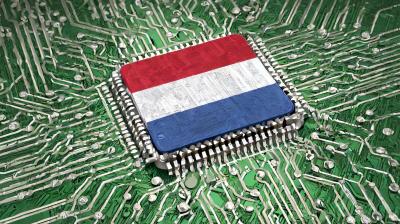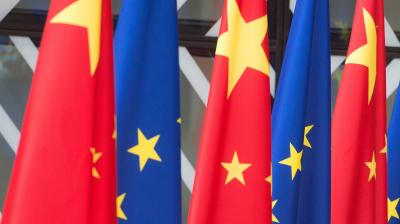Technological De-risking in Netherlands-China Relations
This article was featured in the ISPI Dossier 'European Elections: Setting the Tone for China-EU Relations' in the lead up to the European elections.
The Dutch approach to China may be characterized as "protect where necessary and invest in technological leadership"
In recent years the Netherlands’ China policy has undergone profound change, informed by a broader paradigm shift from a singular focus on economic efficiency towards embracing economic security. Previously, the prevailing mode of relations with China was characterised by a focus on economic opportunities and deepening of trade and investment. This started to shift in the late 2010s, and by 2019, the Dutch government summarised its approach to China in the catchphrase ‘open where possible, protect where necessary’. Since then, the balance between openness and protection has shifted towards the latter. The Dutch approach today may be characterized as “protect where necessary and invest in technological leadership”. Economic security and digital open strategic autonomy have become buzzwords – more so than de-risking. In practice, this means that new export controls, industrial policy, and resources strategy are being implemented; and investments in Indo-Pacific action and through Europe’s Global Gateway are deepening.
Paradigm shift: from Economic Efficiency to Economic Security
The issue of foreign direct investment (FDI) screening illustrates the stronger scrutiny and gradual politicisation of trade and investment relations with China. Back in 2016, the acquisition by Chinese investment firms of a majority stake in the Dutch semiconductor company Nexperia was uncontroversial. In late 2022, Nexperia could still acquire chip company Nowi, although concerns about strategic – rather than economic – motivations of FDI had grown. Following the adoption in 2023 of an investment screening act (which was established rather late compared to many other EU member states), Nexperia’s acquisition was one of the first to be considered based on the retrospective effect of the new law. Although the government in 2024 concluded that the acquisition falls outside the scope of the screening law, parliamentarians called for action. In an even more far-reaching move, the Dutch parliament in early 2024 unanimously adopted a motion calling for an expansion of the screening law into vegetable and seed breeding.
Although Dutch officials avoid the C-word and emphasise that the screening mechanism – and other economic security policies – are country-agnostic, there can be little doubt that China is the key reason for the widening scope of Dutch economic security policies. The paradigm shift is motivated by growing concerns in The Hague about rising Chinese influence and strategic dependencies on China.
Over the years, the US government has played a significant role in heightening awareness of potential national and economic security concerns. This started in 2018 with questions about equipment for 5G networks provided by Chinese suppliers like Huawei and ZTE, and extends to the export to China of semiconductor machinery, such as ASML’s most advanced equipment.
On other issues, including FDI screening and economic coercion, it was the European Commission that pushed the Netherlands to adopt a more geostrategic mindset on technology issues. The Commission’s leadership on China policy has served the Dutch government well by offering a justification for tougher Dutch policies in the eyes of Beijing and of the Dutch private sector. For example, the EU’s designation of China as simultaneously a partner, a competitor, and a rival has allowed the Dutch government to justify its new export controls on the basis of national security concerns, while at the same time still working on enhancing the broader trade relationship with China.
For their part, Dutch intelligence agencies have cautioned knowledge institutions and companies about Chinese espionage, including in annual reports. Although these policy developments were initially met with some reluctance, today’s forward-leaning policies in the field of knowledge security illustrate that such concerns have by now been internalised by Dutch ministries. The world-renowned research of Dutch universities and companies – including agricultural technology breakthroughs in Wageningen and quantum advancements in Delft, Eindhoven and Enschede – cannot go undefended.
Although market-based thinking that prioritizes cost-effectiveness and open economies is thus no longer the holy grail, many Dutch officials continue to be wary of throwing away the baby with the bathwater. The aim is to balance economic security and national security with openness.
Reducing unwanted dependencies and strengthening Dutch industry at home and abroad
The Dutch government is a proponent of Open Strategic Autonomy and has worked on implementing economic security policies across various critical sectors. The Netherlands is a frontrunner in the area of semiconductors and more recently turned its focus to the maritime and agritech sectors. Policies span the three dimensions of protection, promotion and partnership highlighted in the 2023 European economic security strategy.
Critical sectors are identified in several ways. In order to mitigate unwanted dependencies, all government ministries have been tasked to identify vulnerabilities, put forward ‘protect’ policies and convene in the taskforce on strategic dependencies. Dependencies on China for active pharmaceutical ingredients in generic medicines and solar panel capacity are points of concern. On the ‘promote’ side, the Dutch government in January 2024 identified ten crucial technology sectors that will be given priority as part of the National Technology Strategy. Particularly important are quantum and semiconductor technologies. When it comes to the risks posed by Chinese apps, TikTok, AliExpress, WeChat, as well as some Russian and other apps are banned from civil servants’ phones due to higher risks of espionage.
Overall, the semiconductor sector is a key point of attention in all three pillars of the Dutch economic security policies, as well as in the Netherlands-China bilateral relationship. Like the rest of the world, China highly depends on ASML’s machines. New Dutch export controls mainly restrict the shipping to China of the most advanced – and some second-tier – lithography machines. Semiconductor manufacturing equipment has become a key issue for the Chinese government in the bilateral dialogue, with regular calls on the Netherlands not to blindly follow US’ policy. On the ‘promote’ side of Dutch economic security policies, ‘Project Beethoven’ consists of an investment worth 2.5 billion euro in the ecosystem of the chip sector around Eindhoven – home to ASML. Another sectoral push that particularly concerns China is the maritime manufacturing industry sectoral agenda, which specifically names China as a challenge.
Next to sectoral initiatives, the Dutch government in recent years has invested in strengthening its information base, its capabilities to collaborate with trusted partners, and its assistance to the private sector and knowledge institutions. This includes the Economic Security Contact Point for Entrepreneurs, the National contact point for knowledge security, the Economic Security protection fund as well as the Economic Security Attaché network posted to Dutch embassies – two of which in Beijing, and several in countries neighbouring China.
The 2019 China Policy Paper that heralded the shift to the basic premise of ‘open where possible, protect where necessary’ put in motion a number of new initiatives in the Netherlands’ China policy. These include the consolidation of interministerial coordination mechanisms on China; additional China-related staff especially at the Ministries of Foreign Affairs, Economic Affairs and Climate Policy, and Education, Science and Culture; and the establishment of the China Knowledge Network aimed at knowledge creation and dissemination within the national government.
Finally, the Netherlands is investing in what may be called ‘indirect China policy’ abroad. Partnerships with trusted countries are deepened, as are investments with third countries in the framework of the Indo-Pacific Guidelines (2020) and the Africa Strategy (2023); growing investments in Global Gateway; and enhanced engagement, for example with Indonesia and India.
Now what: New government, new Commission?
The future direction of policies is uncertain as a more conservative, EU-critical government assumes power in the Netherlands and a new Commission will be installed in Brussels after the European Parliament elections. The coalition agreement reached by four Dutch political parties in May 2024 has a strong focus on resilience and highlights the importance of reducing strategic dependencies, particularly on China in the field of critical raw materials. However, proposed structural cuts in research and innovation as well as in civil service may reduce rather than strengthen the technological competitiveness of companies and government capabilities to act in the field of economic security. Also, despite foreseen investments in Invest-NL – a business development vehicle to finance sustainable and innovative entrepreneurship in the Netherlands – it is unclear whether investments in Indo-Pacific action and Global Gateway will be sustained. The paradigm shift towards economic security – and with that, Dutch policy towards China – is unlikely to change profoundly. The real question will be to what extent the Netherlands will continue to invest in its own technological strength and whether it will continue to be part of a group of European frontrunners that invest in offering alternatives to increasingly competitive and influential Chinese technologies.












